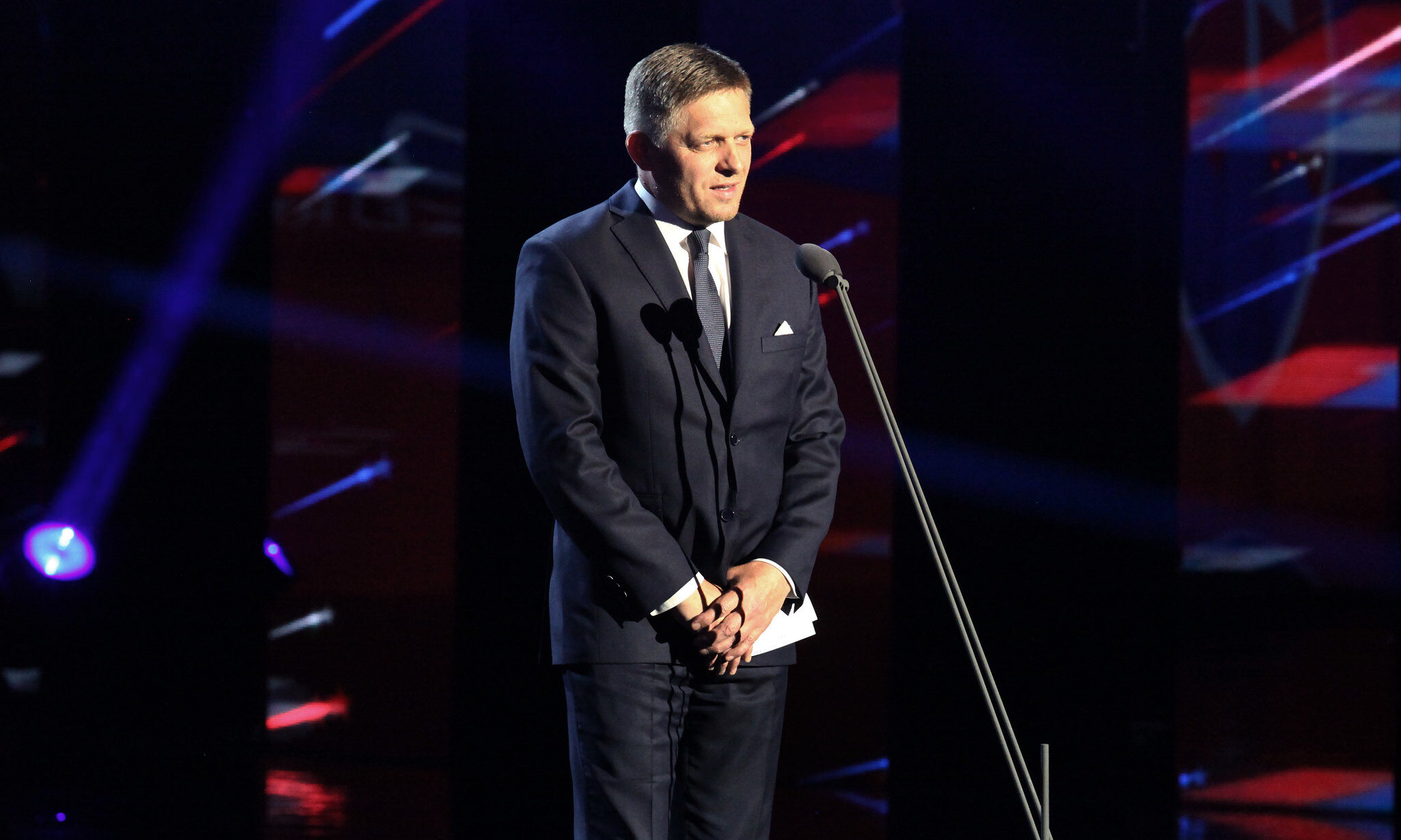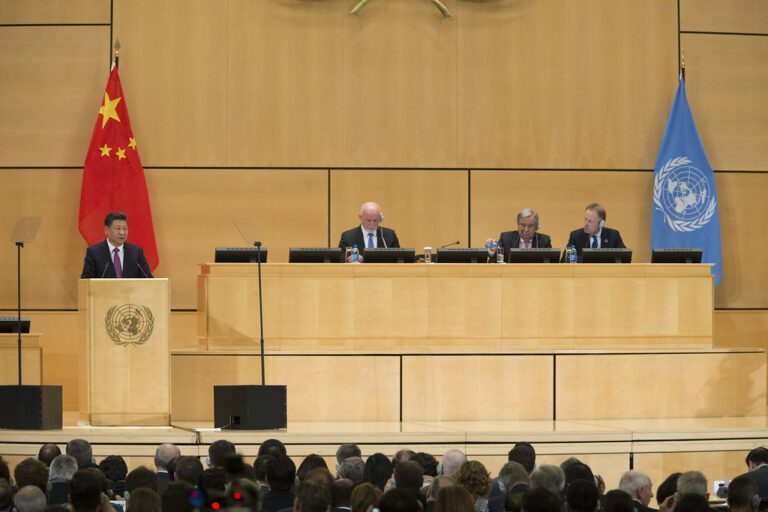Will Slovak Elections Bring a Turnaround in the Country’s China Policy?

With Slovak parliamentary elections around the corner, many are worrying that a new Orbán will rise in Bratislava, changing the direction of the country’s policy towards the East.
This article is part of a series from CHOICE focusing on the impact of elections on countries’ China policy.
Every election is said to be finding Slovakia at a critical juncture in a struggle for the future of the country and even the survival of the young country’s democracy. This discourse is often a way to mobilize voters to come to the ballot box, and this time is no different. However, from a foreign policy perspective, the impact of the September 30 snap elections might really prove to be pivotal and felt around Europe.
After years in the opposition, former Prime Minister, Robert Fico, is returning with vengeance, and his SMER-SD party is leading in the polls. While Fico’s party is nominally socially democratic, it has always been far removed from a typical Western European style of social democracy, focusing instead on conservative social values and courting the nationalist vote.
Yet, while on foreign policy issues, Fico has largely stuck to a pro-Atlantist and pro-European stance whilst prime minister (with a large caveat concerning migration), during its time in opposition over the past three years, the party platform has changed significantly.
Riding on the popular discontent with the unstable, even chaotic governance style of a group of parties leading the country between 2020-2023, Fico and his party have increasingly used inflammatory rhetoric weaved with anti-liberal narratives. In effect, the longest-serving prime minister in modern Slovak history has reinvented himself as an anti-establishment figure, a remarkable feat.
The support of the previous government, formed by a group of populist, center and center-right parties, for Ukraine, has become a popular target for SMER-SD. This has been made possible by the economic woes related to inflation that have eroded the public’s willingness to continue supporting the Slovak eastern neighbor and extending aid to Ukrainian refugees in the country. In criticizing the government, SMER-SD has often repeated pro-Kremlin narratives, directly echoing Russia’s justification of the war.
“War in Ukraine did not start yesterday, or the day before. It started in 2014, when Ukrainian Nazis and fascists started killing Russian citizens in Donbas and Luhansk,” rambled Fico at a campaign event.
“We are a peaceful country. We will not send a single round to Ukraine,” warned the veteran politician, vowing to stop the military support for Ukraine. Here, the previous government was a trailblazer, donating, for example, the country’s entire fighter jet fleet to Kyiv. No more of that, promises Fico, instead vowing to focus on the needs of the Slovak population and national interests.
Hungary’s Prime Minister, Viktor Orbán, has become a popular figure in Slovakia during the election campaign, as his brand of foreign policy is something that SMER-SD representatives and other opposition figures frequently bring up as a vision for Slovakia. On Russia, Orbán’s Hungary has stood apart from the European consensus, and this is what the potential new Slovak leadership is saying would like to emulate, steering Slovakia away from its steadfast pro-Western direction.
It is thus a natural question whether the example of Orban’s China policy, where Budapest has also championed a distinct approach, might also inspire copycat efforts in Slovakia, which has so far stuck to the mainstream on the European China policy and has arguably become more hawkish under the previous government.
Discovering China?
China, it is safe to say, has never been such a fixture in Slovak domestic discourse and national imagination as Russia. The election campaign discourse has thus also been dominated by Russia-related topics. However, China has also become a more salient issue than ever before, as shown by the new paper of the MapInfluenCE project authored by Nikoleta Nemečkayová.
SMER-SD for its part mostly discusses China as a reference point to attack the West or to distance itself from policies that it criticizes. In the election program, the party pledges to not interfere in other countries’ internal affairs, including “countries like China or Vietnam, which have opted for governance models differing from parliamentary democracy.” The program also criticizes the EU for driving Russia and China together with its policies, while pledging to lead foreign policy “of all directions.”
Fico is also on record publicly supporting China’s so-called ‘peace plan’ for Ukraine, which also garnered support from the radical far right. Indeed, it is the Republika party, with roots in the neo-Nazi movement, that is perhaps surprisingly one of the strongest champions of China in the country. The party chairman Milan Uhrík also heaped praise on the Chinese ‘peace plan’, even meeting with the Chinese mission to the EU in Brussels to discuss the issue. In his role as an MEP, Uhrík has lambasted the EU’s efforts to reshape its policy on China, denying that the Asian power represents a threat to the bloc.
The election program of the Republika party also envisions developing stronger ties with the BRICS countries, which are often presented as a counterweight of the demonized West. Similar rhetoric can be found in the pronouncement of the SNS, a nationalist party that has been in government with SMER-SD before and has advocated building closer economic links with Beijing at the time.
On the other side of the political aisle among the center and center-right parties, some of whom have been in government between 2020 and 2023, most are skeptical of China. A large role is played by prominent MEPs active also on the domestic scene, who are often bringing the European agenda to internal politics. This is especially the case for KDH (Christian democrats), PS (centrist liberal party), but also SAS and Demokrati (both center right).
For example, the KDH politician Miriam Lexmann, who is also one of the two co-chairs from the European Parliament of the Interparliamentary Alliance on China (IPAC), has long stressed the issues related to human rights abuses in China, the crackdown in Hong Kong, but also challenges related to strategic dependencies or transnational repression by Beijing.
Michal Šimečka, the leader of the PS party (now second in polls) and concurrently one of the vice-presidents of the European Parliament, has also supported stronger common joint policy towards China, highlighting that any China’s support for Russia in its aggression against Ukraine must serve as a “red line” for the EU. Similar narratives, echoing the changing European discourse on China, are present among representatives from the other parties as well.
As for the SaS party, while it does not mention China directly in the election program, it has been notable for championing the cause of developing cooperation with Taiwan under the previous government. This included a visit of the party member Karol Galek in the role of deputy minister of economy to Taiwan in 2021, which Beijing has tried to prevent from happening.
Finally, there are also parties that have had ambiguous positions on China even if in their general outlook, they have tried to position themselves as pro-EU and pro-Western. This includes HLAS-SD, now the third strongest party in the polls which split away from SMER-SD in 2020, and has backed a business-first approach to Beijing, and the center populist Sme Rodina party led by Boris Kollár.
In his role as the Speaker of the Slovak parliament, Kollár visited China in the spring of this year. While this was not reported in Slovak media, Kollár was quoted as repeating China’s talking points during his meetings, such as “the world is diverse, we cannot engage in confrontation or lecturing just because of a different [political] system.” During the visit, he also called for closer economic cooperation, playing up, for example, potential Chinese investments in the Slovak railway infrastructure.
At the same time, it is quite interesting that some China-related issues are not given appropriate attention in the domestic political discourse, such as the potential role of Chinese investments in electric vehicle production and related supply chains in Slovakia. The fact that Volvo, which is set to open a huge factory in Eastern Slovakia producing electric vehicles, is owned by a Chinese company Geely, has been largely overlooked.
With the recent news of more investments by Chinese companies, and developments across the border in Hungary, one would expect the issue to become a bigger topic, especially as the car-making industry is absolutely pivotal to the Slovak economy (the country is number one globally in per capita car production) and has at times accounted for around three-fourths of Slovak exports to China. When the issue is discussed, it is mostly in the context of opposition to EU plans to phase out the use of internal combustion engines, without reference to Slovak potential in the electric vehicles sector.
Post-Election Turn?
Is Slovakia in for an Orbánist turn in its foreign policy?
The outcome will of course be determined by the results of the vote and the forming of the ruling coalition. Whether SMER-SD joins forces with (a combination of) HLAS-SD, SNS, Sme rodina, or even the extremist Republika, Slovakia is likely to change tack on its overall foreign policy direction.
On the other hand, the success of the PS together with a group of center and center-right parties, with a potential addition of HLAS-SD or Sme rodina, may bring continuity to Slovak foreign policy.
Yet, even if SMER-SD emerges victorious, it might not necessarily herald a complete reordering of Slovak geopolitical positioning. Despite all the virulent rhetoric, SMER-SD continues to support Slovakia’s membership in the EU and NATO. Moreover, there have been indications late in the campaign that Fico is trying to blunt his combative rhetoric in order to assuage foreign partners (and investors) that he is going to be a pragmatic actor and that Slovakia under his leadership will not be a source of instability.
On the specific issue of China, it is quite telling that even if China is praised in the Slovak political context, it is mostly instrumentalized to serve a pragmatic role in domestic politics. There are next to no specific proposals for how to expand its relationship with Beijing, and, indeed, very little interest on the Slovak political scene in China-related issues on their own merit.
If the past record of Fico is any guide, China also might not figure highly on the agenda of the new government. While touting cooperation with China in his early days as prime minister in 2006-2010, he has gradually become disillusioned with the lack of results of economic cooperation and has not spent significant political capital on the issue. This stands in contrast with the developments in the neighboring Czech Republic, or, indeed, Hungary.
Still, Fico habitually used China as a weapon to target his political opponents, such as when he criticized then-President Andrej Kiska for meeting with the Dalai Lama in 2016.
Ultimately, a lot will depend on what a potential Fico government will set out to achieve in domestic policy. If Fico opts for bending the whole system of democratic institutions to serve the interests of himself and his patronage networks, something he has been heavily hinting at, he may ultimately end up in a similar position as Orbán, who has developed a system where Fidesz illiberal kleptocracy lives in symbiosis with close ties with Russia and China. For Orbán, relations with these powers are used as a bargaining chip against the West, even if he continues to depend on the European funds.
However, in the end, Fico, a shrewd politician than he is, might just as well again show his penchant for pragmatism and decide that joining a pariah group is not so attractive after all.
Written by
Filip Šebok
Filip Šebok is an analyst at CEIAS. He was a China Research Fellow and Project Manager at the Association for International Affairs (AMO) in Prague, Czech Republic.


